Caring for Newborn Puppies
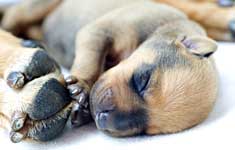
In an ideal world, the mama dog would be able to provide everything all of her puppies need, but in the real world, you may need to step in to assist if she can’t or won’t care for them properly. If a litter is especially large or if there are problems during whelping, she may be physically unable to take care of all of the puppies’ needs. In some cases, a mother might reject one or more of her pups, particularly if they are sickly or under-sized.
Newborns have four major needs for the first few weeks of their lives: warmth, food, hygiene, and physical safety.
Keeping Newborn Puppies Warm
Newborns, particularly if they are very small, may have a hard time maintaining their body heat. Typically, puppies cuddle with each other or with their mother to conserve and share body heat. When one of the puppies becomes too warm, he or she will simply move away from the group to cool off.
To simulate this if you have to take over care of the pups, you will want to provide a temperature gradient so that one end of the puppies’ area is warm, the other cool. This can be done by providing a heating lamp over one end of the box. Alternatively, hot water bottles can be wrapped in blankets or towels and placed at one end of the pen.
Under no circumstances should a heating pad be used for puppies. If the pup falls asleep on a heating pad, he or she can be seriously burned, and the dog’s sharp teeth can easily puncture the protective coating over the electrical wires in both the pad and the cord, causing electrocution.
Feeding Newborn Puppies
Newborn puppies typically need to be fed every 2-3 hours. Although mother’s milk is best because of the immunity it passes from mother to pups, there are acceptable substitutes if mom is not up to the task. Puppies receive most of their immunity within twelve hours after birth, so make sure all of the puppies get to suckle at least once from the mama soon after they are born.
Human baby formula does not meet the nutritional needs of puppies and should not be used. The breeders at Leerburg Kennel recommend whisking together the following ingredients:
- 10 oz. of goat's milk (may substitute 10 oz. of canned evaporated milk thinned with three ounces of boiled water)
- 1 raw egg yolk
- 1 Tablespoon mayonnaise
- 1 cup whole yogurt (not skim or fat free)
- ½ teaspoon of karo syrup
If you are using canned evaporated milk, boil the water then let it cool. Boiling water has a temperature of 212 °F, which is way too hot for the puppies. Once the water has cooled, you will make the formula, and then heat it on the stove to about 100 degrees.
Care should be taken not to over-blend the ingredients to the point where bubbles form, as they can cause very painful gas bubbles. This formula can be kept in the refrigerator for up to seven days.
Puppies should be fed only a liquid diet for the first 4 - 5 weeks, and then gradually weaned to solid food. To begin the weaning process, feed the formula in a dish for a few days to get the puppy weaned from the bottle. Once they have the lapping thing mastered, mix a small amount of puppy kibble or raw ground beef with the formula. As the pups are able to tolerate it, increase the amount of solids and decrease the amount of formula. By 8 weeks, the pups should be totally on solid food.

Hygiene for Newborn Puppies
If you’ve ever observed a mama dog with her puppies, you’ve no doubt noticed that she spends a lot of time licking them. This is not solely to remove that funky puppy smell. Licking a puppy’s belly and anus actually stimulates the dog’s intestines, preventing constipation.
If you are taking over for the mama, use a washcloth soaked in warm water to gently rub each puppy’s belly and anus a couple of times each day. If it’s warm outside, feel free to do this outdoors so the dog begins to associate being outdoors with going potty.
You can give each puppy a warm sponge bath as needed to remove urine and any leftovers stuck in his or her fur and wrinkles. At this young age, however, soap and shampoo should not be used.
Doggies Den: Latest Articles
 Homemade Thanksgiving Treats for Your Dog
Homemade Thanksgiving Treats for Your Dog
NUTRITION We all want to include our dogs in our holiday celebrations, but hopefully, you're aware that sharing table scraps with your dog isn't always the best idea.
 Keeping Your Dog Safe during the Summer Months
Keeping Your Dog Safe during the Summer Months
HEALTH Summer is coming on fast, so it’s time to plan how you will keep your dog safe and healthy through the lazy, carefree, warm days.
 Vaccination Time Again-Keeping Your Puppy Healthy
Vaccination Time Again-Keeping Your Puppy Healthy
DOG HEALTH So you have your new puppy picked out. There are quite a few shots, treatments and examinations that will keep the newest member of your family healthy.
 Canine Thanksgiving Feast
Canine Thanksgiving Feast
NUTRITION With the wide variety of food at Thanksgiving dinner, chances are you'll want to give your dog something special, too. If you're contemplating what to feed your dog for the holiday, here is a guide to a great Canine Thanksgiving Feast.
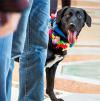 Dog Walking Tips Every Owner Should Know
Dog Walking Tips Every Owner Should Know
DOG FUN Walking your dog is not only crucial to keeping him healthy and happy, it strengthens the bond between your canine friend and his caregiver. There are a lot of obstacles out there. Don’t forget these simple tips to keep your walk fun and safe in the outside world.
 The Benefits of Physiotherapy for your Dog
The Benefits of Physiotherapy for your Dog
HEALTH The same techniques that physiotherapists use to treat a variety of injuries and conditions in humans have been adapted to suit animals with great success. Family pets, show dogs, and working dogs can all benefit greatly from physiotherapy. Dogs whose activities involve a lot of agility are especially susceptible to the types of problems that physiotherapy can address.
 The Decision- Adding a Dog to Your Family
The Decision- Adding a Dog to Your Family
FIRST TIME OWNERSBringing a dog into your family is a decision where many people don’t realize it’s magnitude until after they have the dog. There are a number of things that you need to research before you decide to purchase a dog, and it starts right in your own home.
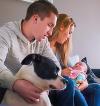 Bringing Your Dog Into Your New Baby's Life
Bringing Your Dog Into Your New Baby's Life
HEALTH Many believe that a dog and a new baby cannot happily coexist, so therefore the dog has to go. This is not necessarily the case.  A new baby does not mean you have to abandon your dog.

Doggies Den:
Most Popular Articles
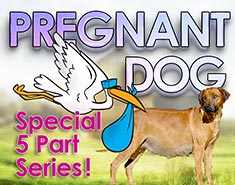
Dog Pregnancy Symptoms
HEALTHIf you suspect your dog might be pregnant, check out part one in this series on pregnant dogs, where we cover pregnant dog symptoms.
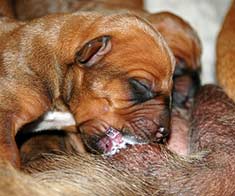
Dog Birth
HEALTHIn the third article of our dog pregnancy series, we look at the wonderful, but messy, process of bringing newborn puppies into the world.
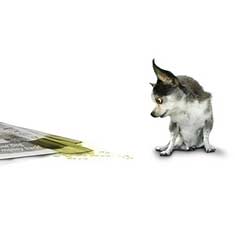
Indoor Dog Potties
DOG PRODUCTSIt's been a long day at work. You were so busy, you didn't even take time to eat a sandwich, let alone run home to let your dog out. You're on your way home, knowing the poor dog is crossing his or her legs by now, when your car breaks down, delaying you even further. Can't somebody make this easier?
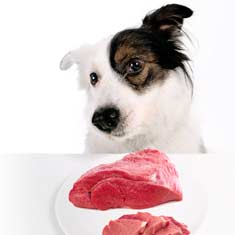
Your Dog’s Digestive System
PHYSIOLOGYEver wonder why your dog eats so fast? Or why he eats gross things? Or why he gets sick to his stomach? Or why his waste stinks so bad? Some of these things are normal, some are not.

Canine Respiratory System
BREATHINGThe basic function of your dog's respiratory system is to bring oxygen in to and remove carbon dioxide from the body. Knowing the symptoms of respiratory diseases can help you help your stay healthy.
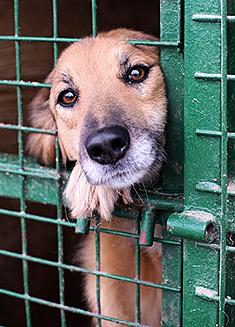
Shelter Dog Adoption Tips for Success
ADOPTION Are you intimidated by the prospect of "rescuing" a dog from a shelter? One reason that you may be wary of adopting a dog from a shelter is not knowing how to choose. Adopting a dog from a shelter can be a rewarding process, if you're prepared to do a reasonable amount of research.
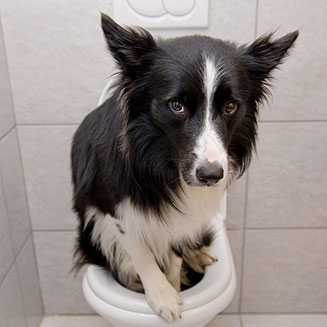
Canine Urinary Tract Infections
SYMPTOMS AND TREATMENTDoes your dog seem to be having trouble relieving his or her bladder? Learn how to recognize the signs of urinary tract infections and how to treat them before they spread.
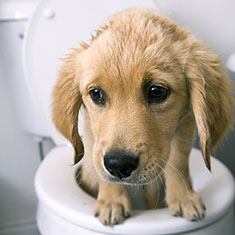
What to do for Dog Diarrhea
SYMPTOMS AND REMEDIESIf you have dogs in your house for any length of time, you have likely experienced at least one bout of dog diarrhea. Beyond the pain in the tuckus involved in cleaning up the mess, you should know what causes diarrhea, and when it's important to see the vet.
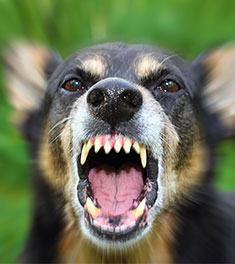
What to do for a Dog Bite
DOG BEHAVIOR Getting bitten by a dog can be scary, and you may be tempted to run around in circles for a while, trying to figure out what to do. Here's our guide to help you manage the situation.
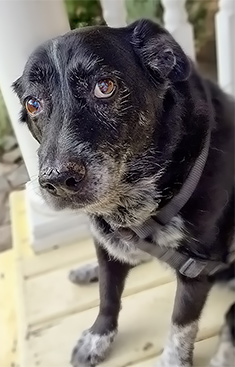
Top Ten Tips for Living with a Senior Dog
DOG HEALTH Bringing home a new puppy is so exciting, but it doesn’t take all that long for your exuberant puppy to grow into a senior dog who may have special needs. Here are the doggies.com top ten tips for taking care of your companion who has been with you through so much.
